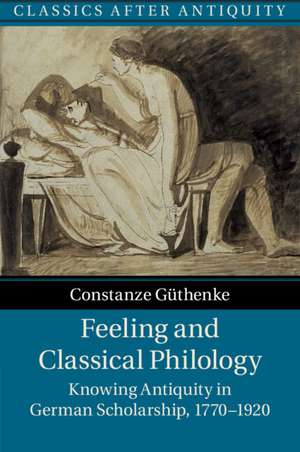Feeling and Classical Philology: Knowing Antiquity in German Scholarship, 1770–1920: Classics after Antiquity
Autor Constanze Güthenkeen Limba Engleză Paperback – 18 mai 2022
| Toate formatele și edițiile | Preț | Express |
|---|---|---|
| Paperback (1) | 201.98 lei 6-8 săpt. | |
| Cambridge University Press – 18 mai 2022 | 201.98 lei 6-8 săpt. | |
| Hardback (1) | 691.66 lei 3-5 săpt. | |
| Cambridge University Press – 4 mar 2020 | 691.66 lei 3-5 săpt. |
Din seria Classics after Antiquity
-
 Preț: 281.67 lei
Preț: 281.67 lei -
 Preț: 214.49 lei
Preț: 214.49 lei -
 Preț: 177.01 lei
Preț: 177.01 lei -
 Preț: 234.26 lei
Preț: 234.26 lei -
 Preț: 216.36 lei
Preț: 216.36 lei - 9%
 Preț: 593.31 lei
Preț: 593.31 lei -
 Preț: 177.16 lei
Preț: 177.16 lei -
 Preț: 176.39 lei
Preț: 176.39 lei -
 Preț: 282.65 lei
Preț: 282.65 lei -
 Preț: 282.87 lei
Preț: 282.87 lei -
 Preț: 223.85 lei
Preț: 223.85 lei -
 Preț: 177.86 lei
Preț: 177.86 lei
Preț: 201.98 lei
Nou
Puncte Express: 303
Preț estimativ în valută:
38.65€ • 40.46$ • 31.98£
38.65€ • 40.46$ • 31.98£
Carte tipărită la comandă
Livrare economică 07-21 aprilie
Preluare comenzi: 021 569.72.76
Specificații
ISBN-13: 9781107504295
ISBN-10: 1107504295
Pagini: 241
Dimensiuni: 152 x 229 x 13 mm
Greutate: 0.33 kg
Ediția:Nouă
Editura: Cambridge University Press
Colecția Cambridge University Press
Seria Classics after Antiquity
Locul publicării:New York, United States
ISBN-10: 1107504295
Pagini: 241
Dimensiuni: 152 x 229 x 13 mm
Greutate: 0.33 kg
Ediția:Nouă
Editura: Cambridge University Press
Colecția Cambridge University Press
Seria Classics after Antiquity
Locul publicării:New York, United States
Cuprins
Introduction: feeling and philology; 1. The potter's daughter: longing, Bildung, and the self; 2. From the symposium to the seminar: language of love and language of institutions; 3. 'So that he unknowingly and delicately mirrors himself in front of us, as the beautiful often do': Schleiermacher's Plato; 4. 'Enthusiasm dwells only in one-sidedness': knowledge of antiquity and professional philology; 5. 'The most instructive form in which we encounter an understanding of life': the age of biography; 6. The life of the Centaur: Wilamowitz, biography, Nietzsche; Epilogue: on keeping a distance.
Notă biografică
Descriere
Argues that German classical philology personified antiquity and imagined scholarship as an inter-personal relationship with it.
